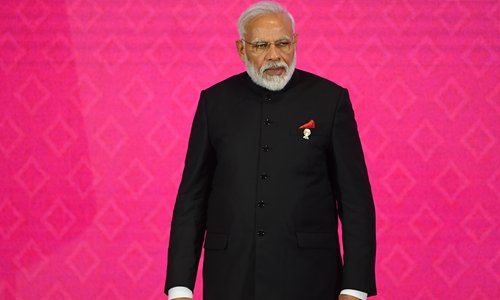HOME >> OPINION
Fear of Chinese products keeps India away from regional trade bloc
Source:Global Times Published: 2019/11/5 19:03:40

India's Prime Minister Narendra Modi attends the 3rd Regional Comprehensive Economic Partnership (RCEP) Summit in Bangkok on November 4, 2019. Photo: AFP
The 3rd Regional Comprehensive Economic Partnership (RCEP) Summit took place in Bangkok on Monday. Leaders from 16 RCEP countries issued a joint statement after the summit, which said "15 RCEP participating countries have concluded text-based negotiations for all 20 chapters and essentially all their market access issues; and tasked legal scrubbing by them to commence for signing in 2020." India decided to keep negotiating. It seems that the 15 RCEP countries would sign the agreement without India. But RCEP's door is still open for India.
It is regrettable that India failed to reach an agreement with 15 other countries at this RCEP summit. But India's attitude is not surprising. Going by the current political environment in the country, the major decision, it can be argued, is understandable.
India is afraid that joining the RCEP will impact its manufacturing industry, it is especially concerned about the influx of cheap products from China. It hopes that the RCEP could have a lower level of free trade and can thus become more beneficial to India. However, the level of trade facilitation between other RCEP negotiating countries has already been high. In meeting India's demands, the RCEP will hardly be able to improve free trade in the entire region and would hence become meaningless.
Joining the RCEP is beneficial to India in general, just like China joining the WTO in 2001. At the time, the Chinese people had various concerns, but the country has a strong decision-making mechanism. It turned out that the pressure of entering the WTO led to China's industrial progress and significantly promoted industrialization in the country.
Indian government is hobbled by the lack of power to make major decisions as various interest groups, infighting and vested interests hold it back. Countries with a Western-style electoral system could be easily held back by short-term interests. Attempts to reform carrying the risk of affecting existing interests face huge resistance.
Currently, India's opposition parties are blasting Prime Minister Narendra Modi over the RCEP. Some industry associations are also against the RCEP. Moreover, given India's conservative style of negotiating, it won't make concessions easily. All this has resulted in India staying out of the agreement reached by 15 other countries.
No country in history fell behind because of opening itself up. When it comes to opening-up, India is more conservative than many smaller countries which are far less developed. It is not a good sign.
But whether to join and when to join the RCEP is a sovereign decision of India. It is more an issue of economic strategy and should not be politicized.
Without India, the scale of RCEP will be reduced. But it will still become one of the largest free trade zones in the world. Since it is an open platform, the possibility of India joining in the future cannot be excluded.
New Delhi backing out of the RCEP deal will not affect China-India economic relations. The trade volume between the two countries has been rising and the trend will likely continue. Beijing and New Delhi could find new areas for economic and trade cooperation. China and India are neighboring countries. Their long-term development isn't possible without the positive energy that stems from enhanced exchanges and collaboration between them.
The article is an editorial of the Global Times. opinion@globaltimes.com.cn
Posted in: VIEWPOINT,ASIAN REVIEW